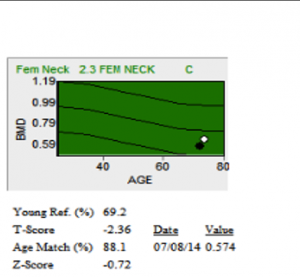DEXA, which stands for Dual-energy X-ray absorptiometry, is a non-invasive medical imaging technique used to measure bone density and assess bone health. It plays a crucial role in diagnosing and monitoring conditions like osteoporosis, a disease characterised by weakened and fragile bones.

During a DEXA scan, a small amount of ionizing radiation is directed at the bones, typically the hip and spine. The machine measures the amount of X-rays absorbed by the bones, providing precise information about their density. This data is then used to calculate a T-score, which compares an individual’s bone density to that of a healthy young adult of the same gender. The result helps healthcare professionals determine the risk of fractures and the overall health of the patient’s bones.
DEXA scans are highly accurate and considered the gold standard for bone density measurement. They are especially valuable for specific groups, such as postmenopausal women, older men, individuals with fragility fractures, those on long-term steroid medications, and people with certain medical conditions that affect bone health. The results of a DEXA scan can guide treatment decisions, lifestyle modifications, and preventive measures to maintain or improve bone health.
- Postmenopausal Women: Women who have reached menopause experience a significant decline in estrogen levels, which can accelerate bone loss. Additionally, factors like genetics and lifestyle choices can impact bone health. Hence, DEXA scans are advised for postmenopausal women to assess their bone density and evaluate their risk of osteoporosis.
- Men Over 50: Like postmenopausal women, older men are also at risk of osteoporosis. Men over the age of 50 should consider DEXA scans, especially if they have risk factors like a family history of bone fractures or low bone density.
- Individuals with Fragility Fractures: Fragility fractures, such as a broken hip or wrist from a minor fall, are red flags for potential bone issues. In such cases, a DEXA scan can help determine the extent of bone loss and guide appropriate treatment and preventive measures.
- Long-term Steroid Use: Prolonged use of corticosteroid medications can weaken bones and increase the risk of fractures. If you’ve been on these medications for an extended period, your healthcare provider may recommend DEXA scans to monitor bone health.
- Certain Medical Conditions: Conditions like rheumatoid arthritis and other autoimmune disorders can affect bone health. DEXA scans can provide valuable insights into bone density changes and guide treatment decisions.
- Family History: If osteoporosis runs in your family or if you have close relatives with a history of fragility fractures, it’s essential to consider DEXA scans as a preventive measure.
Those who may not necessarily need a DEXA scan:
- Young Adults with No Risk Factors: Young adults with no known risk factors for osteoporosis and good health are unlikely to benefit significantly from DEXA scans. Focusing on a healthy lifestyle, including a balanced diet and regular exercise, is critical to building and maintaining strong bones.
- Pregnant Women: DEXA scans involve a small amount of radiation, which is generally not recommended during pregnancy unless there’s a compelling medical reason. However, after pregnancy, it may be considered if necessary.
- Children: Children typically have developing bones, and DEXA scans are not a routine tool for assessing bone health in this age group.
It’s essential to emphasise that DEXA scans are just one part of the equation. Lifestyle factors such as diet, exercise, and avoiding smoking and excessive alcohol consumption play pivotal roles in maintaining good bone health. If you or anyone you know falls into one of the categories where DEXA scans are recommended, consider consulting with the experts at the London Osteoporosis Clinic for personalised guidance and care.

